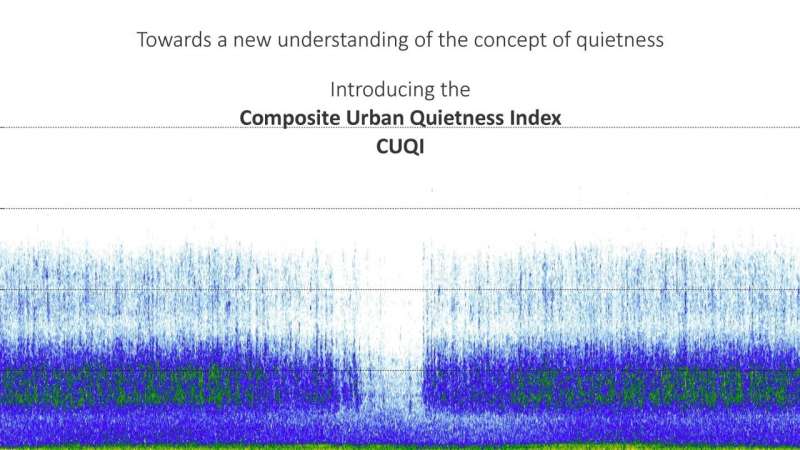Measuring sound diversity of quietness

The world is filled with myriad sounds that can overwhelm a person with relentless acoustics. Noise is so prevalent in everyday life that the concept and achievement of comfortable quiet is hard to define.
During the 180th Meeting of the Acoustical Society of America, which was held virtually June 8-10, Aggelos Tsaligopoulos, from the University of the Aegean, described how quiet could be measured in the hopes of better understanding its impact on people. The session, "Towards a new understanding of the concept of quietness," took place Wednesday, June 9, at 11:20 a.m. Eastern U.S.
Tsaligopoulos said there is a dualism between noise and quiet, meaning quietness so far is viewed as a contradiction and as the lack of something, even if that something is noise. Quietness in the urban context is more than the absence of noise—it's searching for wanted noise in order to avoid the unwanted.
"The context and the environment surrounding the listener changes dramatically the way we understand quietness, highlighting the phenomenology in acoustic perception," Tsaligopoulos said. "So, what if we try to break the association between noise and quietness? What if we try to assign to the term quietness quantifiable characteristics that can be subject to measurements?"
The Composite Urban Quietness Index is an effort quietness quantification based on the levels of acoustic complexity in an area. The goal is to give a new meaning to quietness in terms of sound complexity and provide for a reduction in noise intensity.
Tsaligopoulos points out stress can be caused by high-intensity sound but also by silent acoustic environments. He said there could be a "sweet spot" of quietness that reduces the stress without creating it because it is too quiet, but he believes this is equivalent to mediocracy.
"It is time to look beyond our phenomenological short-term pleasure and realize that well-being is a long-term multidisciplinary effort that we need to plan ahead, keeping in mind ecological sustainability environmental equity and perhaps biocultural diversity."
Stella Kyvelou, from Panteion University of Social and Political Sciences; Nefta Votsi, from the National Observatory of Athens; Aimilia Karapostoli, from Democritus University of Thrace; and Chris Economou and Yiannis Matsinos, from University of the Aegean, contributed to this research.
More information: Aggelos Tsaligopoulos et al, Towards a new understanding of the concept of quietness, The Journal of the Acoustical Society of America (2021). DOI: 10.1121/10.0004554
Journal information: Journal of the Acoustical Society of America
Provided by Acoustical Society of America





















